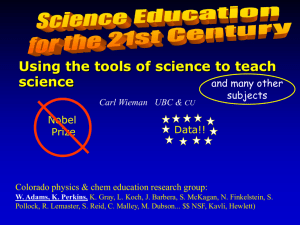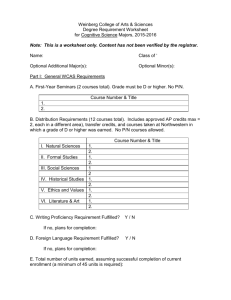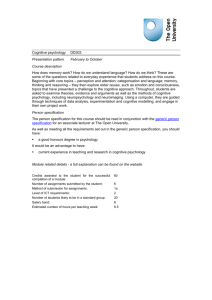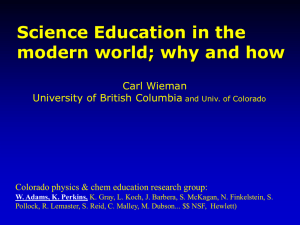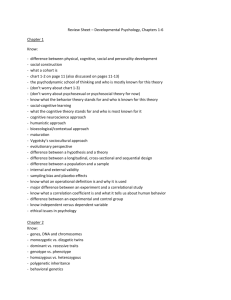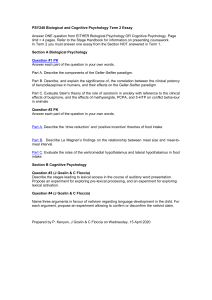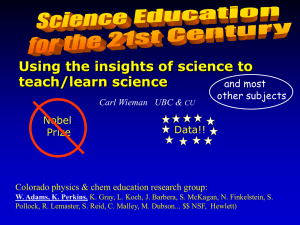(COSMIC) at UMass Boston presents:
advertisement
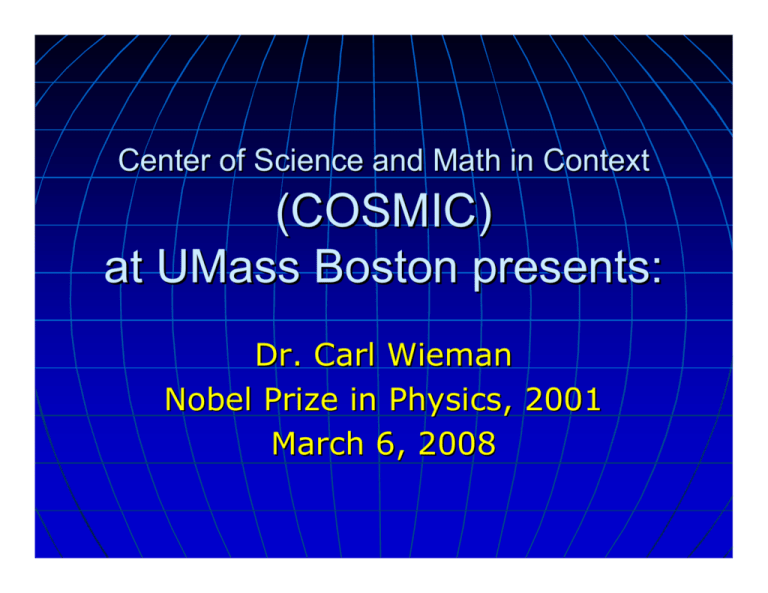
Center of Science and Math in Context (COSMIC) at UMass Boston presents: Dr. Carl Wieman Nobel Prize in Physics, 2001 March 6, 2008 Introductions Chancellor Keith Motley • University of Massachusetts Boston President Jack M. Wilson • University of Massachusetts Dr. Arthur Eisenkraft • Distinguished Professor of Science Education • Director, COSMIC Using the tools of science to teach science and many other Carl Wieman UBC & CU Nobel Prize subjects Data!! Colorado physics & chem education research group: W. Adams, K. Perkins, K. Gray, L. Koch, J. Barbera, S. McKagan, N. Finkelstein, S. Pollock, R. Lemaster, S. Reid, C. Malley, M. Dubson... $$ NSF, Kavli, Hewlett) Using the tools of science to teach science I) Why should we care about science education? II) What does research tell us about teaching and how people learn? III) Some technology that can help improve learning (if used correctly!) ? IV) Institutional change (brief) --Science Education Initiatives Univ. of Brit. Columbia, and U. Col. Changing purpose of science education historically-- training next generation of scientists (< 1%) • Scientifically-literate populace--wise decisions •Workforce in modern economy. Need science education effective and relevant for large fraction of population! “Bloodletting standard of success” no longer adequate Effective education Transform how think-- Think about and use science like a scientist. Hypothesis-possible, if approach teaching of science like science-•Practices based on good data & standards of evidence •Guided by fundamental research •Disseminate results in scholarly manner, & copy what works •Utilize modern technology Supporting the hypothesis..... What does research tell us about effective science teaching? (my enlightenment) How to teach science: (I used) 1. Think very hard about subject, get it figured out very clearly. 2. Explain it to students, so they will understand with same clarity. ?????????????????????????????????????????? grad students 17 yrs of success in classes. Come into lab clueless about physics? 2-4 years later ⇒ expert physicists! ?????? 17 yr ? Research on how people learn, particularly science. • above actually makes sense. ⇒ opportunity--how to improve learning. Major advances past 1-2 decades Consistent picture ⇒ Achieving learning brain research classroom studies cognitive psychology II. Research on teaching & learning A. Research on traditional science teaching. B. Cognitive psychology research-- explains results & provides principles for how to improve. C. Research on effective teaching practices --implementing the principles A. Research on traditional science teaching -lectures, textbook homework problems, exams 1. Transfer/retention of information from lecture. 2. Conceptual understanding. 3. Beliefs about physics and chemistry. Consistent data from all sciences & levels, but most from introductory physics. Data 1. Retention of information from lecture I. Redish- students interviewed as came out of lecture. "What was the lecture about?" only vaguest generalities II. Wieman and Perkins - test 15 minutes after told nonobvious fact in lecture. 10% remember many other studies-- similar results Cog. Pysch. says is just what one expects! a. Cognitive load-- best established, most ignored. Working memory capacity VERY LIMITED! (remember max 7± 2 items, process 4 ideas) MUCH less than in typical science lecture Mr Anderson, May I be excused? My brain is full. PPT slides will be available Data 2. Conceptual understanding in traditional course. • Force Concept Inventory- basic concepts of force and motion 1st semester physics Ask at start and end of semester-What % learned? (100’s of courses) Average learned/course 16 traditional Lecture courses Fraction of unknown basic concepts learned On average learn <30% of concepts did not already know. Lecturer quality, class size, institution,...doesn't matter! Similar data on higher level courses. R. Hake, ”…A six-thousand-student survey…” AJP 66, 64-74 (‘98). Data 3. Beliefs about physics/chem and problem solving Expert Novice Content: isolated pieces of information to be memorized. Content: coherent structure of concepts. Handed down by an authority. Unrelated to world. Describes nature, established by experiment. Problem solving: pattern matching to memorized recipes. Prob. Solving: Systematic concept-based strategies. Widely applicable. % shift? ~10% intro physics & chem courses ⇒ more novice ref.s Redish et al, CU work--Adams, Perkins, MD, NF, SP, CW *adapted from D. Hammer II. Research on teaching & learning A. Research on traditional science teaching. B. Cognitive psychology research-- explains results & provides principles for how to improve. C. Research on effective teaching practices --implementing the principles Connecting to cog. psychology Expert competence research* Expert competence = •factual knowledge •Organizational structure⇒ effective retrieval and use of facts or ? •Ability to monitor own thinking ("Do I understand this? How can I check?") •New ways of thinking--require extended focused mental effort to “construct”. Built on prior thinking. (changing brain) *Cambridge Handbook on Expertise and Expert Performance recent research--Brain development much like muscle Requires strenuous extended use to develop (classroom, cog. pysch., & brain imaging) self improvement? recent research--Brain development much like muscle Requires strenuous extended use to develop (classroom, cog. pysch., & brain imaging) F=ma Not stronger or smarter! Both require strenuous effort 17 yrs of success in classes. Come into lab clueless about physics? 2-4 years later ⇒ expert physicists! ?????? Makes sense! Traditional science course poor at developing expert-like thinking. Principle ⇒ people learn by developing own understanding. Effective teaching = facilitate development, by engaging, then monitoring & guiding thinking. Continually happening in research lab! ⇒ guidance for improving classroom instruction II. Research on teaching & learning A. Research on traditional science teaching. B. Cognitive psychology research-- explains results & provides principles for how to improve. C. Research on effective teaching practices --implementing the principles What does research say is the most effective pedagogical approach?* ⇒ expert individual tutor Large impact on all students Average for class with expert individual tutors >98% of students in class with standard instruction * Bloom et al Educational Researcher, Vol. 13, pg. 4 Characteristics of expert tutors* (Which can be duplicated in classroom?) Motivation major focus (context, pique curiosity,...) Never praise person-- limited praise, all for process Understands what students do and do not know. ⇒ timely, specific, interactive feedback Almost never tell students anything-- pose questions. Mostly students answering questions and explaining. Asking right questions so students challenged but can figure out. Systematic progression. Let students make mistakes, then discover and fix. Require reflection: how solved, explain, generalize, etc. *Lepper and Woolverton pg 135 in Improving Academic Perfomance What expert tutors do matches research from very different contexts •cog. psychologists-- activities/motivation required for expert mastery •educational pysch. --how people learn, activities most effective for learning. •science education-- effective classroom practices e.g. A. Ericsson et. al., Cambridge Handbook on Expertise… Bransford et al, How People Learn,- NAS Press Redish- Teaching Physics, Handlesman- Scientific Teaching K. Perkins, S. Pollock, et al, PR ST-PER, …. “Expert tutor” in classroom •Motivation- why interesting, useful, worth learning,… •Probe where students are starting from & connect. • Get actively processing ideas, then probe and guide thinking. •Challenging questions that students answer, explain to each other •Timely specific feedback. • Reflection on their learning Engaging, monitoring, & guiding thinking. 5-300 students at a time?! Technology that can help. (when used properly) examples: a. Interactive lecture (students discussing & answering questions) supported by personal response system--“clickers” b. interactive simulations (too physics specific) 1 2 3 When switch is closed, bulb 2 will a. stay same brightness, b. get brighter c. get dimmer, d. go out. (%) a. concept questions & “Clickers”-- "Jane Doe picked B" individual # A B C D E clickers*-Not automatically helpful-Used/perceived as expensive attendance and testing device⇒ little benefit, student resentment. Used/perceived to enhance engagement, communication, and learning ⇒ transformative •challenging questions •student-student discussion (“peer instruction”) & responses •follow up instructor discussion- timely specific feedback •minimal but nonzero grade impact *An instructor's guide to the effective use of personal response systems ("clickers") in teaching-- www.cwsei.ubc.ca Highly Interactive simulations-- novel technology Highly effective when based on/incorporates research on learning. Perfect Classroom not enough! Build further with extended “effortful practice” focusing on developing expert-thinking and skills. (Required to develop long term memory) (homework- authentic problems, useful feedback) Some Data: Results when develop/copy research-based pedagogy • Retention of information from lecture 10% after 15 minutes ⇒ >90 % after 2 days • Conceptual understanding gain 25% ⇒ 50-70% • Beliefs about physics and problem solving, interest 5-10% drop ⇒ small improvement (just starting) IV. Institutional change -- “from bloodletting to antibiotics” Widespread improvement in science education Requirement--change educational culture in major research university science departments CW Science Education Initiative and U. Col. SEI • Departmental level-- internally driven. ⇒scientific approach to teaching, all undergrad courses = goals, measures, tested best practices • Departments selected competitively • Focused $$$ and guidance All materials, assessment tools, etc available on web Visitors program Summary: Need new, more effective approach to science ed. Tremendous opportunity for improvement ⇒ Approach teaching like we do science and teaching is more fun! Good Refs.: NAS Press “How people learn” Redish, “Teaching Physics” (Phys. Ed. Res.) Handelsman, et al. “Scientific Teaching” Wieman, (~ this talk) Change Magazine-Oct. 07 at www.carnegiefoundation.org/change/ CLASS belief survey: CLASS.colorado.edu phet simulations: phet.colorado.edu
